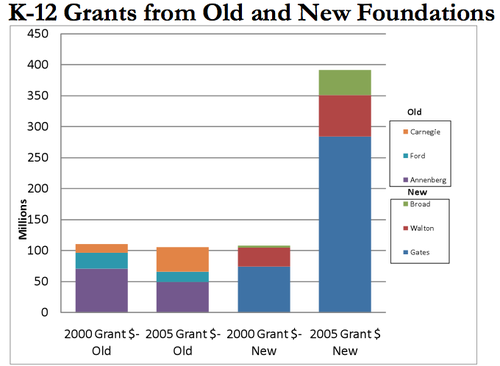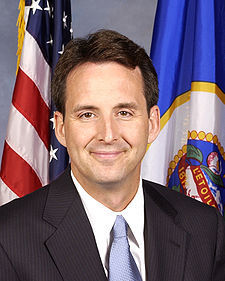Matthew Yglesias's Blog, page 2306
May 18, 2011
Meet The New Education Grant-Makers, Not At All The Same As The Old Education Grant-Makers
Dana Goldstein offers a striking chart from Sarah Rechow about how foundation spending on education issues has changed over the past decade:

Basically the Gates Foundation went from spending a lot of money on education in 2000 to spending more money than all the other big players combined in 2005. I have generally Gates-y views about education policy (and some of that money goes to CAP), so I think it's all good. But the volume of the change is striking.


Open Educational Resources
A number of friends of mine seem to have recently rediscovered the public library, and with physical books rapidly becoming obsolete we're seeing the inevitable upsurge in sentimental accounts of their value and the value of libraries full of them. Of course the purpose of libraries is to make human knowledge as widely available as possible, something for which digital media are ideal. But we haven't had the kind of deliberate public focus on this that our ancestors put into library building.
Kevin Carey reports, however, that this is quickly changing thanks to a little-noted Obama administration initiative:
The concept is simple: Community colleges that compete for federal money to serve students online will be obliged to make those materials—videos, text, assessments, curricula, diagnostic tools, and more—available to everyone in the world, free, under a Creative Commons license. The materials will become, to use the common term, open educational resources, or OER's.
The open-resource movement has been under way since the 1990s, with free content distributed by institutions including Carnegie Mellon and Yale Universities, and the Massachusetts Institute of Technology. But there has never been an effort to promulgate OER's on a $2-billion scale.
For its part, the Education Department hired someone with an unusual résumé for a federal bureaucrat: Hal Plotkin, a community-college trustee and veteran Silicon Valley journalist who has covered business, education, and technology for outlets like CNBC, Forbes, and Inc. Plotkin is no utopian, having heard more than his share of overheated claims about the wonders of technology. Yet he says the program will create "the greatest expansion of access to high-quality education and job-training opportunities in the history of the world."
As Carey notes, there's a lot more to making this a viable alternative to current community colleges than simply creating the big OER database. But this is a really important first step. And the Creative Commons nature of the project means that all different kinds of people and institutions will have access to the source material and thus the ability to try to tinker with it and sort the rest out.


Palestinian Unity Deal Shouldn't Preclude American Action On Israeli-Palestinian Conflict

In terms of domestic politics, it doesn't really make sense for Barack Obama to tackle the Israeli-Palestinian conflict right now. Many members of his political coalition have fairly profound disagreements on this subject, so ducking the issue is appealing. Under the circumstances, it might feel good to hit upon excuses to paper over underlying disagreements and this reporting from Mark Landler and Helene Cooper makes it seem like that's what's happening inside the White House:
Mr. Obama had considered laying out American parameters for a peace deal, several officials said — a move that Mrs. Clinton favored, but one that would have put him at odds with his national security adviser, Thomas E. Donilon, and his top Middle East adviser, Dennis Ross.
But the unity accord between Hamas and Fatah, the party of President Mahmoud Abbas of the Palestinian Authority, effectively killed the plans to try to push through an American proposal, one administration official said. "It's hard to imagine how we do that when Hamas hasn't agreed" to recognize Israel's right to exist and to forswear violence against Israel, the official said.
That doesn't make very much sense to me. Benjamin Netanyahu's political coalition includes people who don't recognize Palestine's "right to exist" and no Zionist political party has agreed to forswear violence against Palestinians. If a Palestinian tries to drive on a Jews-only road or enter the security perimeter of a settlement or walk in the "no Arabs allowed" portion of Hebron he'll be removed. By force. That's what the occupation is. Lack of mutual diplomatic recognition and lack of commitment to resolve disputes peacefully is what the conflict consists of. You don't agree to everything and then have a peace deal. You achieve peace by reaching the deal.
In other news, here's Brian Katulis on the big picture.


Tim Pawlenty And The Conservative Elite

I join Jonathan Chait in being mildly puzzled as to why right-of-center elites seem so dissatisfied with a presidential field that includes Tim Pawlenty, a generically orthodox conservative Republican who managed to win several elections in a somewhat left of center state. To me, that's about what you'd be looking for in a candidate. As it happens, this is something I was trying to ascertain at Saturday evening's party before my night was disrupted by local hooligans.
I think to understand the answer you need to start with the premise (probably unfamiliar to most liberals) that the George W Bush administration was a failure. Social Security spending increased on autopilot. Medicaid spending increased on autopilot. Medicare spending increased on autopilot and increased even more thanks to programmatic increases. No significant anti-union legislation was adopted. No significant environmental regulations were repealed. K-12 education spending went up. Pell Grant spending went up. Then, inevitably, a recession hit, the left came to power, and we got Kenyan-inspired Sharia Socialism. And all this time when George W Bush was running an accommodationist White House, we had Tim Pawlenty in somewhat left-of-center Minnesota positioning himself slightly to Bush's left (on, e.g., climate change) and mostly lacking in any signature badass policy accomplishments.
Compare that to the fact that Paul Ryan and John Boehner got the median House Republican to vote to abolish Medicare, massively cut Medicaid, and then cut all other federal domestic programs even more drastically! Scott Walker as governor of an upper midwest state jabbed a knife through the heart of public sector labor. In Indiana and Ohio anti-labor measures that are arguably even more far-reaching are being implemented. Even states like Maine and New Jersey now have conservative governors whose policy ambitions extend beyond anything associated with the Pawlenty era. To me, the sensible conclusion to be drawn from all this is that the circumstances make the man and that the political opportunities available to state level conservatism in 2011 are just different from the ones available in 2005. But I think the way it looks to conservative elites is that Pawlenty is depressingly lazy, cowardly, politically inept, or something similar.


Will Manufacturing Employment Return To America Powered By Lower Domestic Wage Levels?

The predominant story of American manufacturing for the past thirty years has been rising output and declining employment. Labor-intensive work has been outsourced to foreign countries where labor is cheaper, while American output has been more dominated by mechanization and taken advantage of lower cost inputs. The result has been flourishing quantity of stuff, but declining labor market prospects for men without college degrees. Michael Fletcher reports from the Washington Post on a manufacturing revival in Ohio driven by the other possibility—lower wages:
But the new hiring also reflects another emerging reality of U.S. manufacturing: Many of the jobs don't pay anything close to what they used to. Assembly-line workers who will be making the EdenPure products under the auspices of Suarez Corp. Industries will start at $7.50 an hour.
That's a far cry from the $20 an hour that most workers made with Hoover, which shifted its century-old production lines to Mexico and El Paso in 2007 after concluding that it was too expensive to make its products in the industrial Midwest.
Now it's a bit unfortunate to compare the lowest possible wage at Suarez to the average wage at Hoover, since presumably an apples-to-apples comparison would reflect better on Suarez. Still, the direction of the trend is the same. The good news for the vast majority of Americans who don't work in manufacturing is that these trends have made manufactured goods better, cheaper, and more plentiful. All across the United States of America there's no shortage of vacuum cleaners and other household appliances. But we're paying the price, in part, for selective rationalization of the economy. Doctors, dentists, college professors, and lawyers haven't been subjected to this same kind of pitiless international labor market competition even though such competition would make it much easier for Americans to afford vital professional services. Movie studios, publishers, and record companies have been given stronger legal monopoly rights even as globalization has increased the returns to stardom. We've made it harder, not easier, for working class people to move to high-wage metropolitan areas where job opportunities are plentiful, and we've made it more expensive for their kids to go to college.
I think seeing this as a problem that can or should be addressed by trying to rebuild the manufacturing economy of yesteryear is a mistake, but that's not the same as saying it's not a problem.


'Glee' Has a Down Syndrome Problem
By Alyssa Rosenberg
Spoiler alert, if you haven't watched last night's episode.
Glee has a lot of problems, but I've always thought that the show's use of people with Down syndrome to punctuate its already wildly inconsistent emotional arcs rather than treating them as actual characters has been among the most troubling things about it. The fact that Sue Sylvester has a sister with Down syndrome and that she's reasonably kind to a student with the condition have been a way for the writers to be extraordinarily lazy about writing that character: Sue is a cartoon villain, and those two characters pop up as a reminder that we're supposed to like her sometimes against the mountain of available evidence. Sweeps week is a time when showrunners do all manner of crass things in the name of goosing ratings. But I thought killing Sue's sister, and retroactively filling in the details of her life and personhood, to set the stage for Sue's redemption was particularly distasteful. On the other hand (and I have no faith that the writers will remember this plot point beyond this episode) if Sue actually runs for Congress in Ohio on a platform of moderating health care costs, I am going to have to keep watching the show. I wish Glee would do something irredeemable so I could disavow it. But infuriatingly, it keeps clinging to actual ideas.


Gingrich: "Any Ad Which Quotes What I Said On Sunday Is A Falsehood"
Newt Gingrich is a sort of unusual figure in American public life in that quoting him accurately is sometimes considered to be a kind of smear. For example, about fifteen years ago Gingrich delivered a speech in which he explained that eliminating Medicare immediately isn't "politically smart" or "the right way to go through a transition" so the program should be killed off by creating an adverse selection death spiral that leads it to "wither on the vine" and die. Ever since then, people who don't think Medicare should die have been quoting this statement and Beltway elites have been whining that it's unfair.
Then on Sunday, Gingrich showed amazing consistency by arguing that this exactly the problem with the current House GOP plan to kill off Medicare. He called it too radical and politically unsound, and underscored his preference for a more gradualist approach. This got him in trouble with the wingnuts, so now Newt is pre-warning everyone that "any ad which quotes what I said on Sunday is a falsehood":
I hope his campaign will email me with a full list of accurate quotations that people aren't going to be allowed to use against him.


You Can't Make A Deal If People Don't Want A Deal

The new "gang of six" group negotiating a bipartisan budget deal in the Senate is falling apart with Oklahoma's Tom Coburn pulling out. Philip Rucker and Lori Montgomery explain that Coburn's withdrawal was prefigured by his decision to start acting more like a spoiler than a dealmaker:
Those close to the talks said trouble has been brewing for weeks. Earlier this month, the group appeared to be tantalizingly close to an agreement. But then, Democratic sources said, Coburn started bringing up new issues at every meeting, or demanding that old ones be reconsidered.
For example, Coburn began pressing for sharper cuts to Social Security than had been previously agreed to, according to sources familiar with the talks who spoke on the condition of anonymity because of the private nature of the negotiations. And during a three-hour session late Monday, the sources said, Coburn demanded deep and immediate cuts to Medicare that went beyond anything previously proposed.
This is a familiar pattern in the Obama administration. Bipartisan talks begin on the Hill. They make progress. Sometimes a little progress, and sometimes a lot of progress. Then at some point during the progress-making, the conservative participants in the talks realize that they have a problem—the talks are making progress! So then they start casting around for new demands or new reasons to break off the talks. Eventually, Lucy yanks the football away and we're back to square one.
You can critique the motives or behavior of Tom Coburn (debt) or Lindsey Graham (immigration, climate) or John McCain (Gitmo, climate) or Bob Corker (financial regulation) or Chuck Grassley (health care) on some individual deal or particular gang. But the repetition of the story strongly suggests a structural issue. A short description of the structural issue would be "Mitch McConnell doesn't favor making bipartisan deals with the White House" and that's why there can't be a bipartisan health care bill or a bipartisan climate bill or a bipartisan immigration bill or a bipartisan deficit bill or a bipartisan financial regulation bill or anything else. A longer description of the structural issue would be that objectively speaking if the Republicans' goal is to pick up Senate seats and beat Barack Obama in 2012, it's not in their interests for the 112th Congress to resolve major national issues in a bipartisan way.


Catholic Church Investigation Says Hippies Made Catholic Priests Sexually Abuse Children

Laurie Goodstein reports on the release of an inquiry by American bishops into sex abuse scandals:
A five-year study commissioned by the nation's Roman Catholic bishops to provide a definitive answer to what caused the priest sexual-abuse crisis has concluded that neither the all-male celibate priesthood nor homosexuality are to blame. Instead, the report says, the abuse occurred because priests who were poorly prepared and monitored, and were under stress, landed in the midst of the social and sexual turmoil of the 1960s and 1970s. Known incidents of sexual abuse of minors by priests rose sharply during those decades, the report found, and the problem grew worse when the church's hierarchy responded by showing more care for the perpetrators than the victims.
This hippie-blaming strategy seems unlikely to persuade anyone.


House Republican Proposes Fire-Sale of Utah As Alternative To Raising The Debt Ceiling

In a legislative bargain you do something you don't necessarily want to do in order to get the other side to do something they don't necessarily want to do. And this is the fight that House Republicans want to be having with Barack Obama over the debt ceiling. Except the reality is that House Republicans don't want the US Treasury to be unable to roll over its outstanding debt. So to execute the tactical move they want to make, they need to talk themselves into the idea that they actually don't think the debt ceiling needs to be raised. That's leading to a lot of creative ideas. For example, last night my boss Faiz Shakir wrote about Representative Dennis Ross of Utah's idea that we should engage in panicky real estate sales:
Dennis Ross, a House Republican and a member of the Tea Party caucus, told Reuters: "I don't think Treasury has been up front with us. I am not convinced the sky will fall in on August 3."
Ross added: "I'm not an economist, but I have maintained a household. The federal government owns 70 per cent of Utah, for example. There are federal buildings. If you need cash, let's start liquidating."
I'm somewhat sympathetic to the view that the federal government ought to decrease its holdings of western land. But as with the proposal to sell the gold in Fort Knox, if you try to suddenly liquidate all these assets you just wind up with fire sale prices and much less money than you deserve. Besides which, there's no reason to do this. The federal government's not running out of cash because it's not creditworthy. People are eager to lend the cash. We're running into a cash flow problem solely because of the reluctance of House Republicans to do the right thing on the debt ceiling!


Matthew Yglesias's Blog
- Matthew Yglesias's profile
- 72 followers



